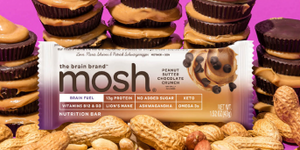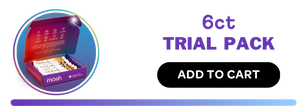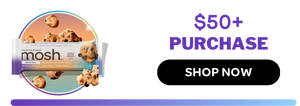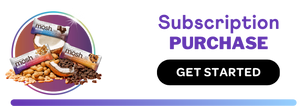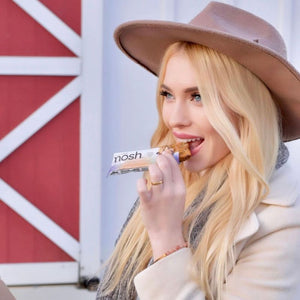Protein bars are a great way to ease hunger while giving your body a good source of a vital macronutrient. This snack can aid muscle recovery after a workout and help you feel full to help prevent overeating.
If you’ve tried a MOSH bar, you probably wish you could eat a protein bar every second of every day (we know — they’re just too delicious). But the best things in life are taken in moderation, including your favorite protein supplements.
Many rumors exist about the best time to eat protein for maximum bodily benefit. From a scientific standpoint, let’s consider the best time to eat a protein bar.
Why Do We Need Protein?
Protein is one of three macronutrients the body needs to function properly.
Proteins are made of chemical “building blocks” called amino acids. Your body uses these amino acids to create strong muscles and bones, hormones, enzymes, and more. While protein can be used as an energy source, energy isn’t its main purpose, unlike carbs and fats (the other two macronutrients).
Out of the 20 amino acids, only 11 are made by the body (called “non-essential” amino acids). The other nine “essential” amino acids need to be consumed from food sources or supplements.
Meat and dairy products are some of the major forms of protein out there. These are often considered complete proteins because they contain the full range of essential amino acids you can’t make on your own.
Plant proteins like nuts and beans usually lack at least one essential amino acid, which is why vegans and vegetarians should generally eat a range of plant-based proteins in order to get the full range of amino acids.
When Should You Eat Protein?
Crossfit enthusiasts and bodybuilders will probably tell you that the best time to eat protein is immediately after a workout. This is because of a theory called the anabolic window, which is thought to be a limited period after a workout where your body is better able to absorb protein and use it more quickly.
Others might argue that the best time to eat protein is before a workout because it can allow your muscles to rebuild as you tear them down through strength training.
But here’s the truth: it doesn’t really matter when you eat your protein.
This might come as sad news for heavy lifters, but the myth of the anabolic window has been disproven. It turns out the body does not synthesize protein differently after a workout compared to any other time, so you don’t need to eat it right after your strength-training routine to gain its benefits.
And eating a protein bar before your workout might actually be a bit more harmful than helpful. This is because protein bars tend to contain fiber. This is a very good thing, as fiber can help regulate digestion. But with that in mind, it can also make you feel like you need to use the bathroom during your workout.
That said, putting a protein bar in your gym bag to serve as a post-workout snack can help you supplement your body with the extra protein you need to maximize your muscle recovery.
The bottom line is that when you eat protein doesn’t seem to matter according to the plenty of studies done trying to find a golden window (that may not even exist).
But, how much protein you eat in a given day definitely does.
How Much Protein Should You Eat a Day?
The recommended amount of protein for men and women each day is 56 grams and 46 grams, respectively. But if you exercise frequently, you’ll probably want to get a bit more than this.
The Academy of Nutrition and Dietetics and the American College of Sports Medicine recommend that athletes get 1.2 to 2 grams of protein per kilogram of body weight daily. That’s about 0.5 to 1 gram per pound.
So if you’re a 175-pound athlete, you might want to get somewhere between 100 and 175 grams of protein a day — that’s a lot more than what the CDC recommends.
This is because athletes use more energy than the average person and need additional nutrients to recover. Protein plays an essential role in building muscles back to their strongest point, so athletes need to increase their intake, especially during strenuous training cycles.
Is It Possible To Eat Too Much Protein?
MOSH bars are delicious, and we know you probably want to eat one for breakfast, lunch, and dinner. But is it possible for you to get too much protein?
Your body cannot store protein, so once your protein needs are met, the extra is used as energy or stored as fat. Generally, excess calories in any form usually get converted to fat to save for later.
So while it might be tough to eat too much protein, it’s not too hard to consume too many calories daily. Not to mention, many high-protein foods tend to be higher in total or saturated fats, which may elevate blood lipids.
The general rule of thumb is to consider the food as a whole rather than just look at the amount of protein.
Does the food also contain vitamins and minerals? Is it low in bad fats and calories? These aspects of food matter just as much for achieving the body, and mind, you want.
It’s generally accepted that about 10 to 35 percent of your daily calories should come from protein, which is about 200 to 700 calories of protein in a 2,000-calorie diet. As you age, this number should rise to fight back against the natural loss of muscle mass and degeneration.
What Are the Best Sources of Protein?
A protein bar is a great way to boost your protein intake while keeping you feeling full until your next meal, but it shouldn’t be the only source of protein you’re consuming every day.
Some of the best high-protein foods are whole, fresh foods. Poultry and fatty fish tend to be lower in fat than red meat but still high in protein. Alternatives to meat, like soy-based tofu, are also great protein sources you can explore to diversify your protein intake.
You can also get a good amount of protein from nuts and nut butter, like walnuts and peanut butter. These are also great sources of healthy fats, like heart-healthy omega-3s.
And of course, you can get protein from supplements and protein-fortified foods. A lot of gym-goers opt for protein powders, which are most commonly in the form of whey, soy, or plant protein. These powders can be mixed with water or mixed into shakes, but often have the downside of being solely focused on protein (aka no other vitamins or minerals in the blend), on top of being notorious for a chalky flavor and texture.
We’re preferential to our own protein bars — we include 12-13 grams of grass-fed whey protein in each deliciously crafted MOSH bar (which makes our bars an excellent source of protein at greater than 20 percent the daily recommended value of protein!).
And, while many protein bars only aim to support your protein intake, we’re all about mind-blowing ingredients to boost your brain, too.
Top doctors and nutritionists recommend each ingredient in our brain fuel blend to serve the specific purpose of supporting your brain. Lion’s mane, ashwagandha, and vitamin D3 are just a few of the beneficial ingredients we’ve intentionally included for your mind, body, and soul.
The Bottom Line
There’s a lot of debate, especially in the fitness industry, about when to eat your protein bars or drink your protein shakes. And while it was historically believed that you should consume protein shortly after a workout because of the anabolic window theory, it has recently been found that protein timing doesn’t matter as much as we believed it did.
Your body metabolizes protein the same way regardless of when you take it, so don’t worry about timing. With that said, eating your protein bar at the same time each day can help you to create a habit of actually consuming that extra protein, which can help you stick to your protein goals.
Most people can get the recommended amount of protein each day with a balanced diet, but if you’re an athlete who needs a little more to get your gains, or if you’re just looking for a convenient and nutritious protein bar as someone on-the-go, our MOSH bars offer 12 to 13 grams of protein along with brain-fueling ingredients to keep you fueled and feeling good.
Click here to craft your three-pack bundle and save big on three flavors, or click here to get started with our trial pack and get a taste of our favorite flavors.
Sources:
Fact or Fiction: The Anabolic Window | Lewis College
Protein | Physicians Committee for Responsible Medicine.
Are you getting too much protein? | Mayo Clinic Health System.


